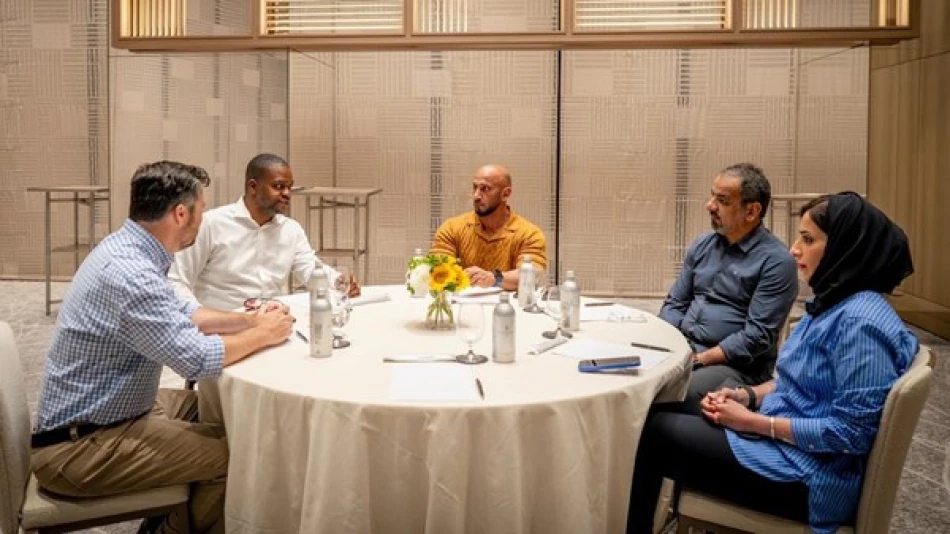
Leading Saudi Executive Explores Global Media and Entertainment Partnerships in Osaka
UAE Media Chief Courts Global Entertainment Giants in Japan to Transform National Content Strategy
The UAE is accelerating its push to become a global media powerhouse, with the country's top media official conducting high-level meetings in Osaka with international entertainment executives. The strategic discussions signal the Emirates' serious intent to leverage artificial intelligence and data analytics to build a world-class content production ecosystem ahead of December's major Bridge Summit in Abu Dhabi.
Strategic Partnerships Target Film Production and Visual Storytelling
Abdullah bin Mohammed bin Butti Al Hamed, Chairman of the UAE National Media Office and the Emirates Media Council, held bilateral meetings with leading global media and entertainment executives in Osaka. The discussions centered on exploring collaboration opportunities in film production, visual storytelling techniques, and building modern media platforms.
The meetings included Courtney LaMarco, Chairman of the Political Action Committee for the Entertainment Industry in Washington State and CEO of LeMarco Global, a company specializing in brand management and media content development. LaMarco's firm has partnerships with global giants including Amazon and Disney, and he serves as executive producer of the Emmy-nominated documentary series "Hoarders" while lecturing at the University of Washington.
Al Hamed also met with Taiki Sakurai, CEO of Japan's Salamander Pictures, a company distinguished by its innovative approach to filmmaking through combining traditional cinematic methods with cutting-edge technology and high-quality visual production.
AI and Data Analytics Drive Media Transformation Vision
Al Hamed emphasized that current technological transformations are pushing media institutions to be pioneers in adopting artificial intelligence tools and data analytics. This reflects a broader trend across the Gulf region, where countries like Saudi Arabia have invested billions in entertainment infrastructure through initiatives like NEOM and the Saudi Vision 2030 entertainment sector development.
"Our vision in the UAE is based on building a flexible, innovative media ecosystem capable of anticipating audience needs and creating content that reflects our national aspirations and established identity," Al Hamed stated.
Regional Competition Intensifies
The UAE's media push comes as regional rivals intensify their own entertainment investments. Saudi Arabia has committed over $64 billion to entertainment and cultural projects, while Qatar leveraged the 2022 World Cup to boost its media profile. The Emirates appears to be positioning itself as the region's creative content hub, complementing Dubai's existing status as a regional business center.
December Bridge Summit Positions UAE as Global Media Hub
The Osaka meetings served as a promotional platform for the upcoming Bridge Summit in Abu Dhabi this December, designed to enhance global partnerships and expand dialogue about the future of media worldwide. This timing suggests the UAE is building momentum for major announcements or partnership reveals at the summit.
Market Implications for Content Industry
For international media companies, the UAE's aggressive courting represents significant opportunities. The country offers tax advantages, state-of-the-art production facilities, and strategic geographic positioning between East and West markets. Major streaming platforms like Netflix and Amazon Prime have already recognized the Middle East's content potential, with Netflix investing heavily in Arabic-language productions.
The focus on AI and data analytics also signals the UAE's understanding that future media success depends on sophisticated audience targeting and personalized content delivery—areas where traditional Hollywood studios are still adapting their business models.
Building National Soft Power Through Entertainment
Al Hamed's emphasis on content reflecting "national aspirations and established identity" indicates the UAE's recognition of entertainment as a soft power tool. This mirrors successful strategies employed by South Korea through K-pop and K-dramas, which have generated billions in economic value while enhancing the country's global cultural influence.
The strategic meetings represent more than business development—they signal the UAE's ambition to export its cultural narrative globally while building domestic creative industries that can compete internationally. Success in this endeavor could position the Emirates as the Middle East's answer to Singapore's role as Asia's media gateway.
Most Viewed News

 Layla Al Mansoori
Layla Al Mansoori






